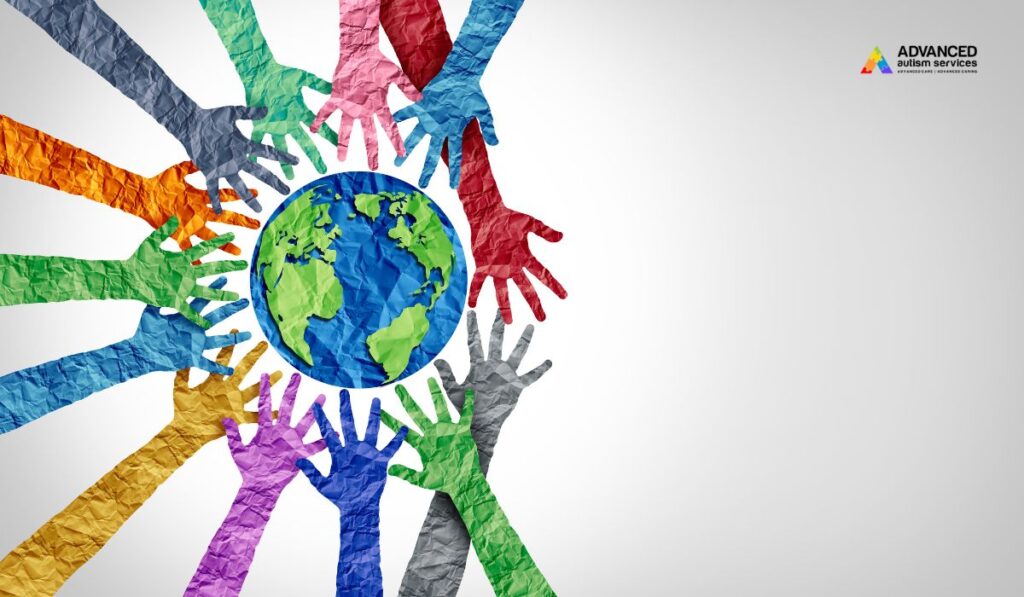Applied Behavior Analysis (ABA) therapy has long been recognized as an effective method in helping individuals with autism spectrum disorder (ASD) improve their social, communication, and behavioral skills. In recent years, the integration of social media platforms into ABA therapy has emerged as a valuable tool, revolutionizing the way therapists engage, educate, and support both individuals on the spectrum and their families. This article aims to explore the role of social media in enhancing ABA therapy treatment.
Enhanced Communication and Support
Social media platforms serve as powerful communication channels, connecting ABA therapists, parents, caregivers, and individuals with ASD in a seamless and accessible manner. Therapists can share valuable resources, strategies, and information about ABA techniques, enabling parents to gain a deeper understanding of their child’s therapy and implement techniques at home. Discussion forums and groups on platforms like Facebook or Reddit provide a supportive community where parents can seek advice, share experiences, and find encouragement from others facing similar challenges.
Accessibility to Resources and Education
The abundance of educational content available on social media facilitates continuous learning and skill development for both therapists and families. Videos, articles, webinars, and live sessions shared by experts in the field offer insights into the latest research, best practices, and innovative approaches in ABA therapy. This readily accessible information empowers parents and caregivers to participate in their child’s therapy journey actively and reinforces consistent implementation of ABA techniques beyond therapy sessions.
Real-time Monitoring and Progress Tracking
Social media platforms equipped with features such as live streaming or video sharing enable therapists to monitor sessions or provide real-time demonstrations of ABA interventions remotely. This capability allows for immediate feedback and guidance, ensuring that interventions are correctly implemented. Additionally, platforms with progress-tracking functionalities facilitate the documentation and analysis of a child’s progress over time, aiding therapists in refining and customizing therapy plans to suit individual needs.
Encouraging Social Interaction and Skill Development
For individuals with ASD, social media can serve as a medium to practice social interaction skills in a controlled and familiar environment. Therapists can create safe, monitored online spaces where individuals can engage with peers, fostering social skills like turn-taking, initiating conversations, and understanding social cues. Virtual platforms also offer opportunities for practicing real-life scenarios through role-playing exercises or social storytelling, promoting the generalization of skills learned in therapy to everyday situations.
Challenges and Considerations
Despite its numerous benefits, integrating social media into ABA therapy comes with challenges and considerations. Privacy concerns, ensuring the credibility of information shared online, maintaining appropriate boundaries, and safeguarding against potential negative interactions are crucial factors that therapists and caregivers must navigate carefully.
Integration of Technology in ABA Therapy
Social media isn’t the only technological advancement impacting ABA therapy. Various apps and software specifically designed for individuals with ASD have emerged, aiding therapists in creating personalized programs, tracking progress, and providing interactive learning experiences. These tools often incorporate elements of gamification, making therapy sessions more engaging and enjoyable for individuals on the spectrum.
Remote Therapy Sessions
The advent of telehealth and video conferencing platforms has made it possible for therapists to conduct remote ABA sessions. This has been particularly beneficial for individuals residing in remote areas with limited access to specialized therapy services. Through virtual sessions, therapists can deliver interventions, offer guidance to parents/caregivers, and maintain continuity of care, ensuring that individuals receive consistent support even from a distance.
Parent and Caregiver Empowerment
Social media’s role in ABA therapy extends beyond connecting professionals and individuals with ASD; it empowers parents and caregivers by providing a platform for advocacy, awareness, and sharing experiences. Parent-led groups and pages offer a space for discussing challenges, celebrating successes, and advocating for greater understanding and acceptance of ASD within communities.
Ethical Considerations and Guidelines
Given the sensitive nature of working with individuals with ASD, ethical considerations are paramount when integrating social media into ABA therapy. Adherence to professional guidelines, ensuring confidentiality, obtaining proper consent for sharing information, and maintaining a respectful online environment are essential principles that therapists and caregivers must uphold.
Potential for Innovation and Collaboration
The dynamic nature of social media fosters collaboration among professionals and encourages innovation in ABA therapy. Researchers, therapists, and educators can easily share findings, discuss emerging trends, and collaborate on projects aimed at improving interventions and enhancing the overall quality of care for individuals with ASD.
Barriers to Access
While social media has immense potential, it’s essential to acknowledge that not all families have equal access to technology or the internet. Economic disparities and limited digital literacy pose barriers, potentially excluding some individuals and families from benefiting fully from the resources available on social media platforms.
Future Directions
As technology continues to evolve, the role of social media in ABA therapy is expected to grow. Augmented reality (AR), virtual reality (VR), and artificial intelligence (AI) applications hold promise in creating immersive and tailored therapeutic experiences for individuals with ASD. However, it’s crucial to approach these advancements with caution, ensuring that they complement, rather than replace, the human-centered approach that defines ABA therapy.
Research and Data Analysis
The utilization of social media platforms in ABA therapy also opens avenues for data collection and analysis. By leveraging data analytics, therapists and researchers can gather insights into the effectiveness of various interventions, identify patterns in behavior, and refine treatment plans based on evidence-driven practices. This data-driven approach contributes to the evolution and refinement of ABA therapy techniques.
Cultural Sensitivity and Diversity
One of the challenges in ABA therapy is ensuring cultural competence and addressing diverse needs. Social media’s global reach enables access to diverse perspectives and practices. Therapists can engage with communities worldwide, learning about cultural nuances, adapting interventions to suit different cultural contexts, and promoting inclusivity within therapy approaches.
Professional Development and Training
Social media platforms serve as hubs for professional development within the field of ABA therapy. Online seminars, workshops, and forums provide continuous learning opportunities for therapists, allowing them to stay updated on the latest research, ethical guidelines, and best practices. This ongoing education enhances the quality of therapy provided to individuals with ASD.
Conclusion
In conclusion, the integration of social media into ABA therapy showcases a constant evolution, poised to reshape how individuals with ASD receive therapy profoundly. Its diverse influence on communication, education, innovation, and collaboration highlights the pivotal role social media holds in enriching the lives of those on the autism spectrum, including their support networks. Upholding ethical standards, accommodating diverse needs, and responsibly embracing technology will continue to refine this integration, ultimately fostering a more inclusive and supportive environment for individuals with ASD globally.
FAQs
How does social media benefit ABA therapy?
Social media facilitates enhanced communication among therapists, parents, caregivers, and individuals with ASD. It provides accessibility to resources and real-time monitoring, encourages social interaction, and aids in tracking progress, thereby improving the overall effectiveness of ABA therapy.
What types of resources are available on social media for ABA therapy?
Social media offers a wide range of resources, such as videos, articles, webinars, live sessions, and discussion forums that provide insights into the latest research, best practices, and innovative approaches in ABA therapy.
How does social media help in remote therapy sessions?
With telehealth and video conferencing platforms, therapists can conduct remote ABA sessions, ensuring individuals in distant areas receive consistent support. This allows therapists to deliver interventions, guide parents/caregivers, and maintain continuity of care.
What challenges come with integrating social media into ABA therapy?
Challenges include privacy concerns, the credibility of online information, maintaining boundaries, and safeguarding against negative interactions. Therapists and caregivers must navigate these concerns carefully.
How does social media empower parents and caregivers?
Social media empowers parents and caregivers by providing platforms for advocacy, awareness, and sharing experiences. Parent-led groups offer spaces for discussing challenges, celebrating successes, and advocating for greater understanding and acceptance of ASD within communities.
What ethical considerations are essential when using social media in ABA therapy?
Adherence to professional guidelines, ensuring confidentiality, obtaining proper consent for sharing information, and maintaining a respectful online environment are crucial ethical principles that therapists and caregivers must uphold.
What role does social media play in professional development for ABA therapists?
Social media serves as a hub for professional development, offering online seminars, workshops, and forums that provide continuous learning opportunities. This helps therapists stay updated on the latest research, ethical guidelines, and best practices in ABA therapy.
How does social media address diversity and cultural sensitivity in ABA therapy?
The global reach of social media enables therapists to engage with diverse communities, learn about cultural nuances, adapt interventions to suit different contexts, and promote inclusivity within therapy approaches.
What is the future outlook for social media in ABA therapy?
As technology evolves, augmented reality, virtual reality, and artificial intelligence applications are expected further to enhance tailored therapeutic experiences for individuals with ASD. However, it’s crucial to ensure these advancements complement rather than replace the human-centered approach of ABA therapy.
How does social media contribute to data-driven practices in ABA therapy?
Social media platforms enable data collection and analysis, allowing therapists and researchers to gather insights into intervention effectiveness and behavior patterns and refine treatment plans based on evidence-driven practices, contributing to the evolution and refinement of ABA therapy techniques.




